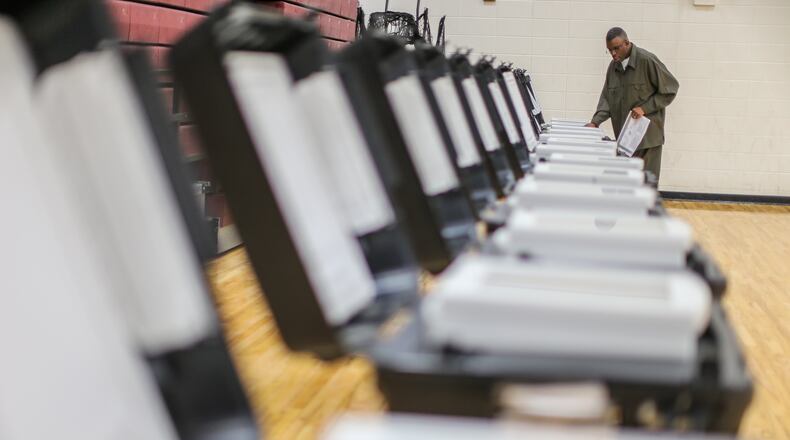Before this November's election, a federal judge will have to decide whether Georgia's electronic voting machines are too hackable to be used any longer.
A lawsuit pending in federal court is trying to force the state government to immediately abandon its 16-year-old touchscreen machines and instead rely on paper ballots.
The plaintiffs, a group of election integrity activists and voters, say the courts need to step in to safeguard democracy in Georgia. Legislation to replace the state's electronic voting machines failed to pass at the Georgia Capitol this year, and tech experts have repeatedly shown how malware could change election results.
But Georgia election officials say the state’s digital voting system is safe and accurate. Secretary of State Brian Kemp recently recertified the machines after tests showed they correctly reported election results.
While scrapping the state's 27,000 electronic voting machines within the next five months would be a drastic move, it's necessary to ensure that hackers aren't altering election results, said Donna Price, a plaintiff in the case and the director for Georgians for Verified Voting, a group advocating for a paper voting system.
“We are asked to trust the word of the election officials that votes are counted as cast. That is not acceptable,” Price said. “No matter what our political beliefs, election outcomes are a matter of life and death: Do we have health care when sick? Do our kids go to war? Is our system of government safe?”
Georgia is one of five states that relies entirely on electronic voting machines that don't leave an independent paper backup. Roughly 70 percent of the country uses some form of paper ballots, which are invulnerable to digital tampering.
The lawsuit, filed in July, asks U.S. District Judge Amy Totenberg to declare it unconstitutional to use direct-recording electronic voting machines like those used in Georgia for any public election. The lawsuit contends that the state could switch to the same paper ballots already mailed for absentee voting.
Most of Georgia's elected officials, including Kemp, a Republican candidate for governor, agree that the state's voting machines should be replaced, but not until the 2020 presidential election. They say the state's elections can be trusted while legislators and the state's next secretary of state debate a different voting technology.
“I am confident that the current system, which is tested by experts for every election, continues to properly capture and reflect all voters’ choices,” Kemp said in a statement last month after the voting machines were tested in a mock election in three counties. “There was an exact and perfect reporting of all votes cast on all tested devices. Based on these results, the examination team found that the examined voting system could be safely and accurately used.”
There’s no evidence that Georgia’s voting systems have been hacked.
To fight the lawsuit, the state hired former Democratic Gov. Roy Barnes to defend Kemp and other election officials.
Barnes said in court last month that the lawsuit is “impractical and crazy.”
Barnes, who was governor when the current system was implemented, said there’s no way the state could implement and test a paper-based voting system in time for the November election. He declined to comment for this article.
“Everybody admits we are going to replace these. We don’t think there has been any harm,” Barnes said. “You cannot create the crisis and then say we have got to do this.”
Electronic voting machines have been thrown out before, but not on as large a scale as in Georgia.
In Virginia, the state elections board voted in September to discontinue using touchscreen voting machines because of potential security vulnerabilities. The decision required 23 cities and counties to change voting equipment within weeks before November’s elections for governor.
There’s ample evidence that electronic voting machines could be penetrated, said David Cross, a Washington-based attorney representing the plaintiffs in the case.
A demonstration at Georgia Tech in April showed how election results could be rigged if voting machines were infected with malware. Russian hackers already attempted to interfere with the 2016 presidential campaign by targeting election systems in 21 states, the U.S. Department of Homeland Security said in August 2016. Georgia wasn't one of those states.
In addition, the state's election center's website exposed election instructions and the personal information of 6.7 million Georgia voters until those documents were removed in March 2017.
“It’s imperative that we eliminate these vulnerabilities before the next election,” Cross said. “There’s absolutely no way to ensure the rights of voters in Georgia without replacing the voting system with one that doesn’t contain vulnerabilities.”
The sanctity of Georgia’s voting equipment has become an issue in the race for secretary of state to replace Kemp when his term ends at the end of this year.
Democrat John Barrow said if he’s elected, he would decertify the electronic voting machines, an action that would compel the state to use paper ballots as a backup.
“Are we going to continue to rely on machines for in-person voting when we know these machines do not meet the statutory standard of reliability?” said Barrow, a former U.S. congressman. “The current method where you record your votes on an electronic medium that cannot be read and understood with the naked eye is totally inadequate in this day and age.”
Republican David Belle Isle said he supports moving toward paper ballots in Georgia, but not unilaterally through the power of the courts or the Secretary of State’s Office.
“That’s an extreme remedy,” said Belle Isle, the former mayor of Alpharetta. “The state of Georgia deserves an honest conversation about what’s next and what creates voter confidence. “
He said Georgia lawmakers should decide on a voting system next year.
Belle Isle faces state Rep. Brad Raffensperger in a July 24 runoff for the Republican nomination for Georgia secretary of state. Raffensperger didn’t return a message seeking comment.
About the Author








